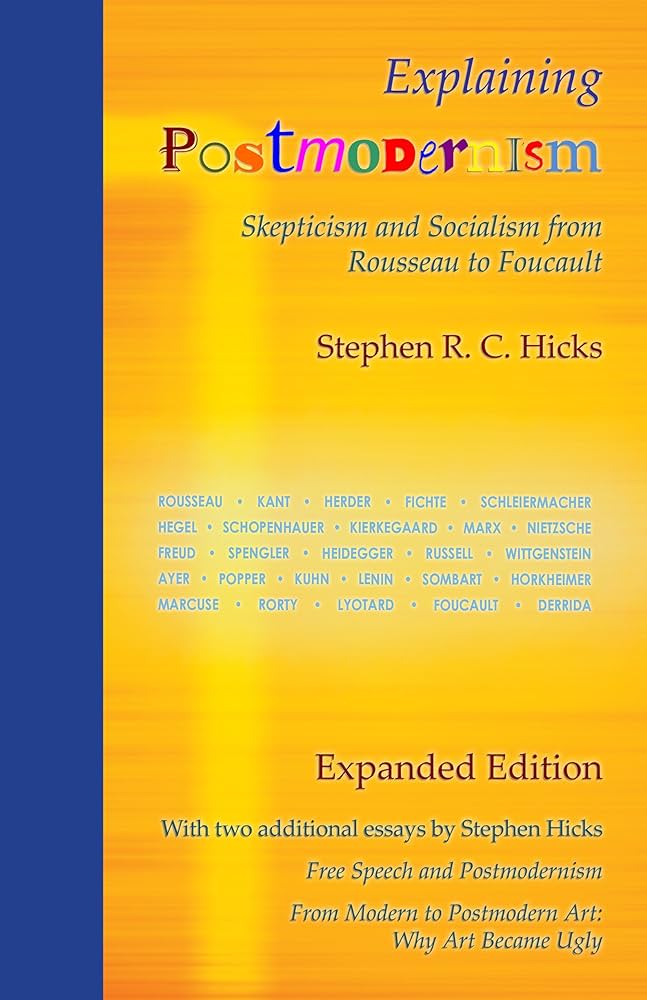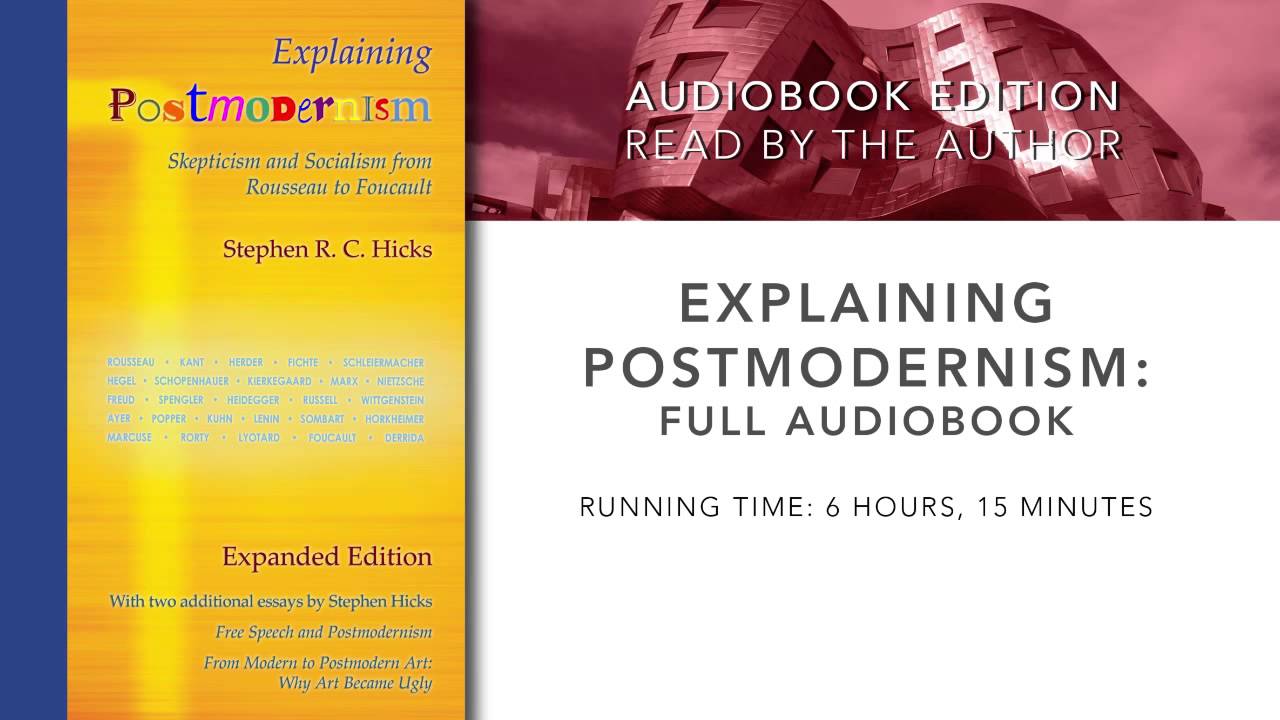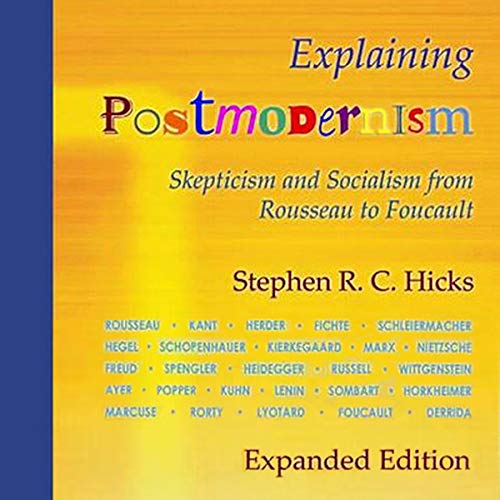**Stephen R. C. Hicks – Explaining Postmodernism Audiobook** Stephen R. C. Hicks explores postmodernism’s origins and influences. The audiobook examines its impact on culture and politics.
Postmodernism emerged as a critical reaction to modernism and Enlightenment ideals. Hicks delves into how postmodernism challenges objective reality and universal truths. He provides a historical context, tracing its roots to influential philosophers like Kant, Hegel, and Nietzsche. The audiobook highlights postmodernism’s skepticism towards grand narratives and its emphasis on power dynamics.
Hicks discusses how postmodernism permeates various fields, including art, literature, and education. This comprehensive exploration helps listeners understand the complexities and implications of postmodern thought. For those interested in philosophy, culture, or contemporary politics, this audiobook offers valuable insights.

Introduction To ‘explaining Postmodernism’
Stephen R. C. Hicks’ audiobook ‘Explaining Postmodernism’ delves into the roots of postmodern philosophy. It provides an insightful analysis of how and why this movement gained traction. This audiobook is a must-listen for anyone keen on understanding the complexities of postmodern thought.
Origins Of The Audiobook
The audiobook is based on Hicks’ acclaimed book, first published in 2004. Its purpose is to offer a comprehensive overview of postmodernism’s development. The audiobook format makes the content accessible to a broader audience.
| Author | Stephen R. C. Hicks |
|---|---|
| First Published | 2004 |
| Audiobook Release | 2010 |
| Genre | Philosophy |
Relevance In Contemporary Culture
Postmodernism remains influential in today’s cultural and academic circles. The audiobook addresses the reasons behind this continued relevance. It explores how postmodern ideas impact education, politics, and art.
- Influence on Modern Art
- Impact on Political Discourse
- Role in Educational Theories
Understanding postmodernism helps grasp the nuances of contemporary debates. Hicks’ audiobook serves as a valuable resource for this purpose.

Author’s Background
Stephen R. C. Hicks, a renowned philosopher, and educator, has significantly impacted modern thought. His audiobook, Explaining Postmodernism, delves into deep philosophical concepts. Understanding his background helps appreciate his insights.
Stephen R. C. Hicks: Philosopher And Educator
Stephen Hicks is a professor of philosophy at Rockford University. He has been teaching for many years. Hicks holds a Ph.D. from Indiana University. His primary focus areas include ethics, modern philosophy, and business ethics.
| Academic Position | Institution |
|---|---|
| Professor of Philosophy | Rockford University |
| Ph.D. in Philosophy | Indiana University |
Hicks has received multiple awards for his teaching and research. He has given lectures worldwide, sharing his expertise with diverse audiences.
Previous Works And Philosophical Contributions
Stephen Hicks has authored several influential books. Besides Explaining Postmodernism, he wrote Nietzsche and the Nazis and Entrepreneurial Ethics.
- Explaining Postmodernism: Analyzes the roots and consequences of postmodern thought.
- Nietzsche and the Nazis: Explores the philosophical basis of Nazi ideology.
- Entrepreneurial Ethics: Discusses the moral principles in business.
Hicks’s work often intersects philosophy with real-world issues. This blend makes his teachings both profound and practical. His clear writing style makes complex ideas accessible. This approach has earned him a dedicated following.
Hicks’s contributions extend beyond writing. He is a sought-after speaker and a respected academic voice. His insights help bridge the gap between theory and practice.
Key Philosophical Themes
Stephen R. C. Hicks’ audiobook, Explaining Postmodernism, dives deep into the core ideas of postmodernist thought. It highlights crucial philosophical themes that challenge our traditional understanding of reality and truth. Below, we explore some of these key themes.
Skepticism Of Objective Reality
Postmodernism questions the existence of an objective reality. It argues that what we consider “real” is subjective. Different people may see the world in different ways. This skepticism challenges traditional views of science and knowledge.
The Role Of Language In Constructing Reality
Postmodernists believe language shapes our reality. Words and symbols create our understanding of the world. This means reality is constructed through language. It affects how we perceive and interact with the world.
Criticisms Of Modernist Ideology
Postmodernism criticizes modernist ideals like progress and rationality. It sees them as tools of power and control. Modernist ideologies are often seen as limiting and oppressive. Postmodernists argue for a more diverse and inclusive perspective.
| Key Theme | Description |
|---|---|
| Skepticism of Objective Reality | Questions the existence of a single, objective reality. |
| The Role of Language in Constructing Reality | Argues that language shapes our perception of the world. |
| Criticisms of Modernist Ideology | Challenges modernist views on progress and rationality. |
Historical Context
Stephen R. C. Hicks’ audiobook, Explaining Postmodernism, delves into the intricate history of postmodernist thought. Understanding the historical context is essential to grasp its development and influence.
Influence Of The Enlightenment
The Enlightenment was a pivotal period in human history. It emphasized reason, science, and progress. Key thinkers like Voltaire, Locke, and Kant championed these ideals. They believed in human potential and rational thought.
This era laid the groundwork for modernity. It promoted individual freedom and democratic governance. The Enlightenment questioned traditional authority. It sparked revolutions in America and France. These movements reshaped societies worldwide.
The Enlightenment’s influence extended into the 19th century. It inspired advancements in technology and education. It fostered a belief in objective knowledge. This period’s legacy is evident in today’s scientific and democratic institutions.
Postmodernism’s Emergence In The 20th Century
Postmodernism emerged as a reaction to modernist ideals. The 20th century was a time of rapid change. Two World Wars and the Cold War caused widespread upheaval. Many questioned the Enlightenment’s promises.
Postmodern thinkers challenged the idea of objective truth. They argued that reality is subjective. Jean-François Lyotard and Michel Foucault were key figures. They believed that power structures shape knowledge. They viewed truth as a social construct.
Postmodernism critiqued grand narratives. It rejected the idea of a single, overarching story. Instead, it embraced diversity and plurality. This movement influenced art, literature, and philosophy. It encouraged skepticism and critical thinking.
The audiobook, Explaining Postmodernism, explores these themes in detail. It provides insight into how postmodernism reshaped intellectual landscapes.
Impact On Academia
Stephen R. C. Hicks’s audiobook, Explaining Postmodernism, has profoundly influenced academia. It has sparked discussions on various subjects. These include curriculum changes and debates on truth and relativism.
Changes In Humanities Curriculum
The audiobook has led to significant changes in the humanities curriculum. Universities have started to revise their course content.
- New courses on postmodernism are now included.
- Classical theories are examined through a postmodern lens.
- Students are encouraged to question established narratives.
These changes aim to provide a more diverse and critical perspective. The goal is to foster critical thinking among students.
Debates On Truth And Relativism
Hicks’s work has ignited debates on truth and relativism. Scholars discuss the nature of truth and its implications.
Two main viewpoints have emerged:
| Viewpoint | Description |
|---|---|
| Objective Truth | Truth is absolute and universal. |
| Relativism | Truth varies with perspective and context. |
These debates encourage students to explore complex philosophical questions. They also highlight the importance of perspective in understanding truth.
Postmodernism In Politics And Society
Stephen R. C. Hicks’ audiobook, “Explaining Postmodernism,” dives deep into the influence of postmodernism on politics and society. This section explores how postmodernist ideas shape modern political movements and societal trends. Postmodernism challenges traditional views, creating a dynamic and often controversial landscape.
Identity Politics
Identity politics focuses on group identity rather than individual identity. It emphasizes the experiences and perspectives of marginalized groups. This approach often highlights race, gender, and sexual orientation. Postmodernism supports these movements by questioning universal truths and promoting diverse narratives.
The audiobook explains how postmodernist thinkers argue that power structures shape our identities. They believe that language and discourse create social realities. This perspective has influenced many social justice movements.
The Culture Wars
The culture wars refer to conflicts between traditional and progressive values. Postmodernism plays a key role in these battles. It questions established norms and promotes cultural relativism. This creates tension between different societal groups.
Hicks’ audiobook discusses how postmodernist ideas fuel debates over education, media, and public policy. For example, some argue that postmodernism undermines objective truth. Others see it as a tool for promoting equality and understanding.
Implications For Liberal Democracy
Liberal democracy relies on principles like freedom, equality, and justice. Postmodernism challenges these principles by questioning the idea of universal values. This has significant implications for democratic societies.
Hicks’ audiobook explores how postmodernist ideas impact political discourse and policy-making. Some critics argue that postmodernism weakens democratic institutions. They believe it fosters division and erodes trust in public systems.
Supporters, on the other hand, argue that postmodernism promotes inclusivity and critical thinking. It encourages people to question authority and seek new perspectives. This can lead to more robust and responsive democratic practices.
Critical Analysis
The audiobook “Stephen R. C. Hicks – Explaining Postmodernism” provides a thorough exploration of postmodern theories. It dives deep into the subject, offering listeners a detailed understanding. But, like any academic work, it demands a critical analysis.
Controversies And Counterarguments
Postmodernism has always been a topic of heated debate. Critics argue that it lacks clear definitions and consistency. They believe its theories are vague. Supporters, on the other hand, see it as a necessary critique of modernist ideals.
One major controversy is the rejection of objective truth. Postmodernists argue that truth is subjective. This stance has led to debates on the nature of reality and knowledge. Another point of contention is the dismissal of grand narratives. Postmodernism challenges the universal truths proposed by science and religion.
Counterarguments to these points often emphasize the importance of objective truth. Critics argue that without it, we risk losing a shared reality. They stress the need for some universal principles to guide society.
Strengths And Weaknesses Of Postmodern Theories
Strengths of postmodern theories include their ability to question established norms. They encourage critical thinking and diversity of thought. Postmodernism promotes a pluralistic view, allowing multiple perspectives to coexist. This inclusivity can lead to a richer understanding of complex issues.
Weaknesses are also evident. One significant weakness is the relativism inherent in postmodernism. By denying universal truths, postmodernism can lead to confusion. It can make it challenging to establish any common ground. Another weakness is the sometimes overly complex language used. This can make postmodern theories inaccessible to many.
A table can help summarize these points:
| Strengths | Weaknesses |
|---|---|
| Encourages critical thinking | Relativism leads to confusion |
| Promotes diversity of thought | Complex language |
| Questions established norms | Challenges establishing common ground |
Understanding these strengths and weaknesses helps in grasping the full impact of postmodern theories. It enables a balanced view of their role in contemporary thought.
The Audiobook Experience
Stephen R. C. Hicks’ “Explaining Postmodernism” audiobook offers a unique experience. Listening to the audiobook brings new dimensions to the content. Audiobooks provide flexibility and accessibility. They allow users to engage with the material on the go.
Narration Style And Effectiveness
The narrator’s style is clear and engaging. The tone remains consistent throughout the audiobook. This makes the complex topics easier to understand. The narrator’s pace is steady, allowing for better comprehension. Key points are emphasized, making the content memorable. This enhances the listener’s ability to retain information.
Comparing The Audiobook To The Print Edition
The audiobook and print edition offer different experiences. The audiobook format is ideal for multitasking. It allows you to learn while doing other activities. The print edition, however, offers a different kind of engagement.
- Flexibility: Audiobooks can be listened to anywhere.
- Engagement: Print editions allow for deeper focus.
- Retention: Audiobooks emphasize key points through narration.
Each format has its strengths. The choice depends on personal preference. Audiobooks are excellent for auditory learners. Print editions suit those who prefer visual learning.
| Aspect | Audiobook | Print Edition |
|---|---|---|
| Flexibility | High | Low |
| Engagement | Moderate | High |
| Retention | Good | Excellent |
In summary, the audiobook experience offers unique advantages. It makes the complex subject of postmodernism more accessible. Whether you choose the audiobook or print edition, both have valuable insights to offer.
Final Thoughts
Listening to the Stephen R. C. Hicks – Explaining Postmodernism Audiobook provides a deep dive into the complex world of postmodern philosophy. It unravels the intricate ideas and historical context that have shaped this influential movement. For those who seek to understand the roots and impact of postmodernism, this audiobook serves as an essential guide.
Key Takeaways From The Audiobook
- The audiobook explains the historical roots of postmodernism.
- It outlines the key thinkers and their philosophical contributions.
- Listeners learn about the cultural and political implications of postmodernism.
- Hicks provides a clear critique of postmodernist ideas.
- The audiobook emphasizes the contrast between modernism and postmodernism.
Recommendations For Further Reading
To deepen your understanding of postmodernism, consider exploring these books:
- “Postmodernism: A Very Short Introduction” by Christopher Butler – This book offers a concise introduction to postmodernist thought.
- “The Postmodern Condition: A Report on Knowledge” by Jean-François Lyotard – A foundational text in understanding postmodernism.
- “Simulacra and Simulation” by Jean Baudrillard – Explores the concepts of reality and hyperreality.
- “The Anti-Aesthetic: Essays on Postmodern Culture” edited by Hal Foster – A collection of essays on postmodern culture.
Engaging with these texts will provide a broader perspective on the themes discussed in Hicks’ audiobook. Each book offers unique insights into the multifaceted nature of postmodernism.

Conclusion
Stephen R. C. Hicks’ audiobook, “Explaining Postmodernism,” offers deep insights into complex philosophical ideas. It’s an essential listen for anyone interested in postmodern thought. This audiobook simplifies challenging concepts, making them accessible. Enhance your understanding of postmodernism by diving into Hicks’ thorough analysis.
Don’t miss this chance to expand your philosophical knowledge.



